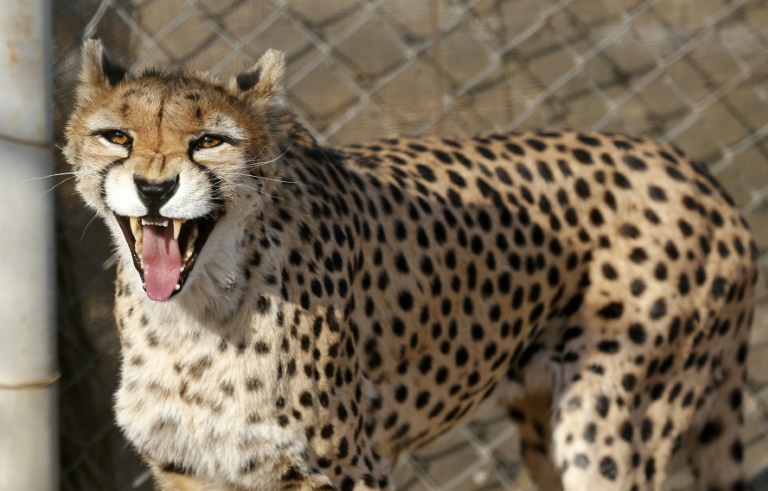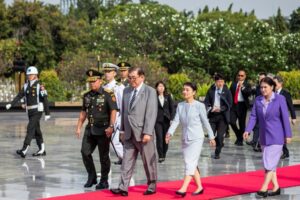Scientists head to Nambia for the latest advances in endangered species’ conservation

An Asiatic cheetah at Tehran’s Pardisan Park – Copyright AFP Fabrice COFFRINI
This week ConGen Global opens. This is a space where the world’s top conservation scientists converge with the next generation of geneticists, who are often regarded as the ‘future’ of conservation.
‘From Parrots of the Caribbean’ to the ‘Tiger Crisis,’ scientists and government officials convene
The Cheetah Conservation Fund (CCF) is hosting ‘ConGen Global,’ focusing on advances in conservation genetics. From 5-15 January 2025, the nine-day practicum at Otjiwarongo, Namibia is dedicated to the application of genomic technologies towards the conservation of biodiversity.
As an example of the importance of such work, the CCF’s own genetic research played a key role in up-listing the subspecies of cheetah (Acinonyx jubatus ssp. soemmeringii) in the Horn African to ‘Endangered’ status on the IUCN Red List. The cheetah occurs mainly in eastern and southern Africa and a few parts of Iran. The fastest land animal in the world, the cheetah has a slender, long-legged body.
CCF was founded by Dr. Laurie Marker in 1990, and it is dedicated to ensuring the survival of cheetahs in the wild. CCF’s research focuses on the biology, ecology, and genetics of the world’s cheetahs. To address the challenge of effectively monitoring the wild cheetah population, CCF built and maintains the only fully capable conservation genetics laboratory at an in-situ conservation site in Africa.
The laboratory aims to address research questions involving cheetah gene flow and geographical patterns of genetic variation, as well as adaptive questions in relation to the cheetah’s behavioral ecology in specific habitats.
READ MORE: Big drop in global cheetah numbers
CCF has also extracted and genotyped samples from all confiscated cheetahs in the Horn of Africa to detect the animals’ origin, providing the date to uplisting of this subspecies to ”endangered’.
ConGen Global 2025
Featuring over 15 renowned international scientists, including Dr. Stephen J. O’Brien, ConGen’s Director and Professor at Nova Southeastern University and Member of the National Academy of Sciences (USA); Eduardo Eizirik, Ph.D., Professor, Pontifícia Universidade Católica do Rio Grande do Sul, Porto Alegre, Brazil; and Laurie Goodman, Ph.D., Publishing Director, GigaScience Press, Hong Kong, China.
ConGen’s 2025 edition is sponsored by the American Genetic Association, Giga Science Press, and the Indiana University School of Public Health.
Through a combination of lectures, discussions, and hands-on training, participants will learn the latest methods, interpretation, and applications of molecular genetic analyses for the conservation of endangered species. For instance, genomic approaches allow for the identification of adaptive genetic variation related to key traits for the response to climate change, such as phenology or drought tolerance.
According to O’Brien: “The annual training workshop entitled “Recent Advances in Conservation Genetics“ was first conceived in the summer of 1996 and has continued for nearly 30 years in remote world locations, relevant to species conservation. We began the course to help fulfill the desire and commitment of young genetics scientists with hopes of contributing to the conservation of endangered species through state-of-the-art scientific advances.”
Species conservation
ConGen 2025 will be opened by Hon. Heather Sibungo, the Deputy Minister of the Namibian Ministry of Environment, Forestry and Tourism. The host committee is led by Dr. Anne Schmidt Kuentzel, CCF’s Director of Animal Health and Research, and Dr. Laurie Marker, CCF’s Founder and Executive Director.
Since 1996, ConGen has been taught by preeminent genomics and conservation science experts. Delegates are drawn from some twenty countries: Australia, Austria, Brazil, China, Colombia, India, Kenya, Namibia, Norway, Pakistan, South Africa, Switzerland, Ukraine, U.K., the U.S. and more.
Topics for 2025 include:
- “How genomics informs the conservation status and management of wolves in Asia”
- “The Earth BioGenome Project: An Enabler of the Coming Revolution in Conservation Genetics”
- “The Cheetah Restoration Project”
- “Global Invertebrate Genome Alliance – A Genomic Perspective for Marine Invertebrate Species
- “The world’s tiger conservation crisis: a genomics perspective”
- “Ecology of Southern African Cheetahs”
The 2025 event is set to feature guest lectures from Julian Fennessy, Ph.D., Co-founder & Director of Conservation, Giraffe Conservation Foundation; Abigail Guerier, M.Sc., Executive Manager, Rhino Conservation, Ongava Game Reserve; and Rainer Hassel, D.V.M., Head of Veterinary Academic Hospital, University of Namibia, among others.
Scientists head to Nambia for the latest advances in endangered species’ conservation
#Scientists #Nambia #latest #advances #endangered #species #conservation




